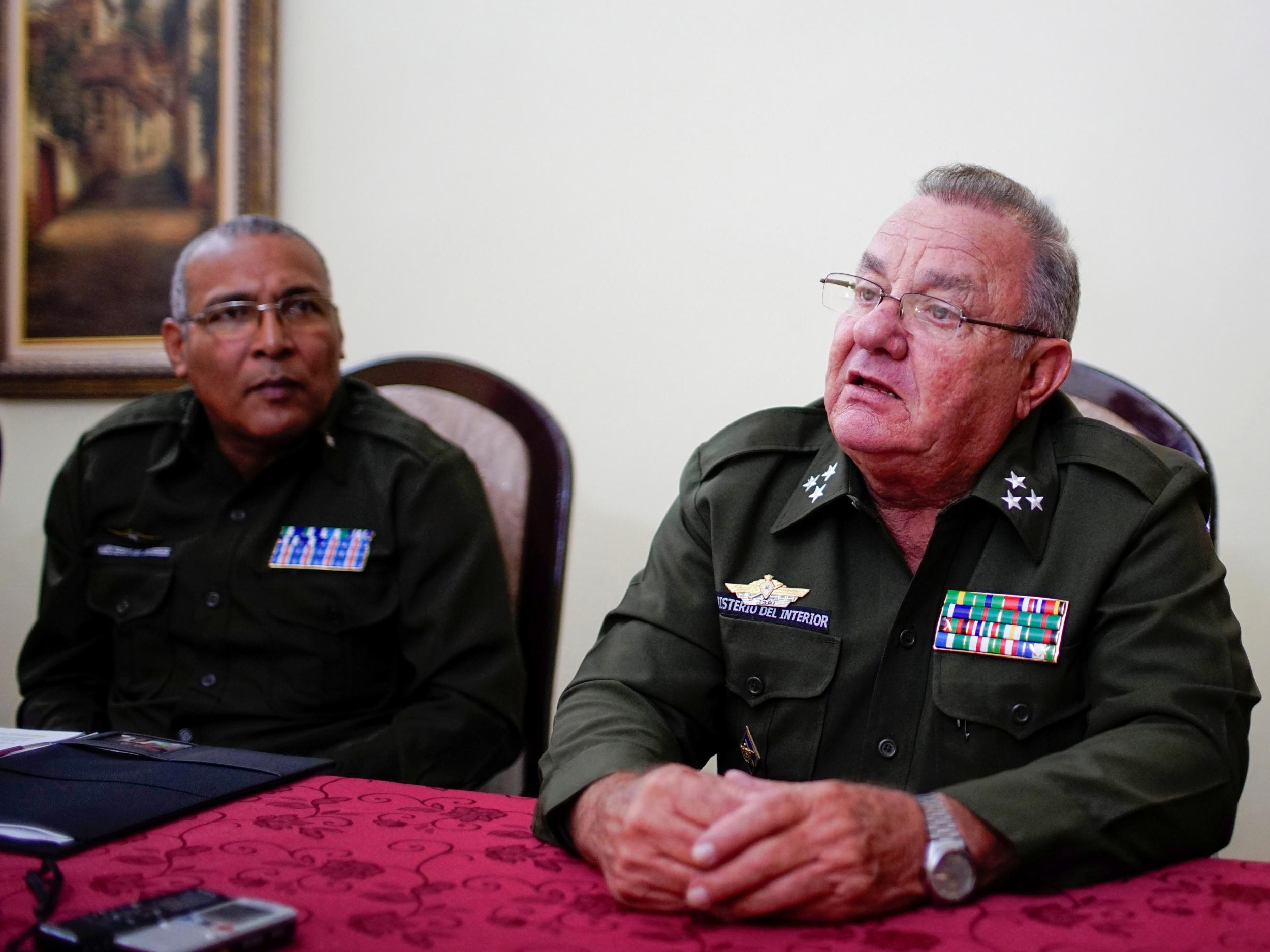US sonic attack allegations are 'science fiction', Cuban investigators say
Colonel Ramiro Ramirez dismisses sensational claims of assaults on diplomats with mystery weapon and accuses Washington of slander

Your support helps us to tell the story
From reproductive rights to climate change to Big Tech, The Independent is on the ground when the story is developing. Whether it's investigating the financials of Elon Musk's pro-Trump PAC or producing our latest documentary, 'The A Word', which shines a light on the American women fighting for reproductive rights, we know how important it is to parse out the facts from the messaging.
At such a critical moment in US history, we need reporters on the ground. Your donation allows us to keep sending journalists to speak to both sides of the story.
The Independent is trusted by Americans across the entire political spectrum. And unlike many other quality news outlets, we choose not to lock Americans out of our reporting and analysis with paywalls. We believe quality journalism should be available to everyone, paid for by those who can afford it.
Your support makes all the difference.Cuban officials investigating US complaints of attacks on diplomats in Havana said talk of acoustic strikes was “science fiction” and accused Washington of “slander” while it refused to cooperate fully with Cuba’s enquiry.
US President Donald Trump said last week he believed Havana was responsible for 24 diplomats being harmed. Washington expelled 15 Cuban diplomats and recalled more than half the US diplomatic personnel from Havana earlier in October.
While Cuba had already denounced the expulsions as “unjustified” and accused the United States of insufficient cooperation, three Interior Ministry officials and a doctor heading the inquiry provided more details in an interview in Havana on Sunday.
Cuba had deployed about 2,000 security officials and experts, from criminologists to audiologists and mathematicians, to investigate the incidents after it became aware of them in February, the investigators said.
The probe has not ended but it had so far failed to uncover any evidence to corroborate allegations of attacks that the United States says have caused hearing loss, dizziness, fatigue and cognitive issues in diplomatic personnel while based on the Communist-run island.
“This is slander by the United States,” said Colonel Ramiro Ramirez, responsible for the security of diplomats in Cuba.
There was no immediate comment from the White House or the US State Department.
Washington officials have raised the possibility that sonic weapons were used to harm the diplomats, according to US media reports. However, Cuban investigators denied such weapons could even have been used by third parties without affecting the health of others or attracting attention.
“It’s impossible. We are talking about science fiction,” said Lieutenant Colonel Jose Alazo, an expert in the criminal investigation unit of the Interior Ministry. “From a technical point of view, that argument is unsustainable.”
The investigators said the United States had supplied 14 recordings of the sound it says the victims heard during the attacks and recorded, for example, on smartphones.
These, however, did not contain anything that could damage human health, they concluded. The noises included the usual suburban sounds such as traffic, footsteps and voices.
They were also characterised by a deviation peak of 7 kiloHertz (kHz) in the frequency band of 3 kHz, similar to the song of a cricket.
An audible sound would need to be very loud - above 80 decibels or akin to a plane’s engine – to have a health impact, they said. Yet only the victims heard the noise, not their families living in the same houses, nor their neighbours.
“We interviewed more than 300 people in the neighbourhood, we also evaluated more than 30 medically, and no one heard these things,” Alazo said.
Even if the US diplomats’ report of loud sounds was misleading and the source of the attacks were infra- or ultrasonic and therefore inaudible to human ears, it would be hard to explain how it could go undetected, the Cuban investigators said.
“You would need a source that could be seen from a satellite, it would be enormous,” said Dr Manuel Villar, an ear, nose and throat specialist.
Finally, only two or three of the alleged victims had hearing problems, according to the US information provided, whereas any kind of sonic attack would cause them in everyone, Villar said.
The United States has not formally accused Cuba of carrying out attacks, but Trump’s comments further damaged relations between the old Cold War foes, which have rapidly deteriorated since he took office.
Canada has said several Canadians had reported similar symptoms to the US diplomats but it has not taken any action against Cuba and has said Cuba had been very cooperative with the investigation.
“There is an anti-Cuban mafia in Miami and we are victims of their dirty work that involve certain people very close to the governing circles of the United States,” Ramirez said.
Anti-Castro Cuban-Americans such as Republican Senator Marco Rubio of Florida have guided Trump’s policy on Cuba, including a partial rollback of the historic detente forged by his Democratic predecessor Barack Obama.
Washington insists its drawdown at its embassy was motivated by concern for the health of its diplomats.
Investigators said US actions did not add up with their accusations. More than 200 friends and relatives of US diplomats based in Havana had asked for visas to visit them between February and July, despite the alleged attacks.
The fact the information the United States provided was late was a major obstacle to resolving the mystery, said the investigators, who refused to comment on the state of cooperation with Canada.
So far, Washington had only officially reported 14 cases of alleged attacks to Cuba, compared with the 24 it had announced to the media, they said.
“It will be impossible to resolve this investigation without more cooperation,” Ramirez said.
Reuters
Join our commenting forum
Join thought-provoking conversations, follow other Independent readers and see their replies
Comments